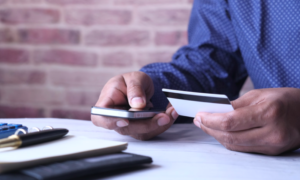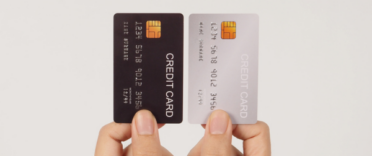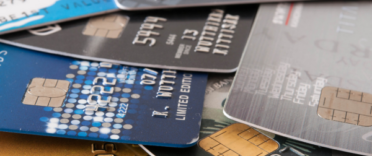 Spending money with a credit card can be both a great way to earn rewards and a quick way to pile up debt. This is also true if you pay bills with credit cards. For some people it can be an extra way to use their rewards card on an expense they would be paying for anyway, but for others it could be a route into increasingly expensive debt. In this article we explain when you can use a credit card to pay your bills and when you should avoid it, plus what the costs and benefits could be.
Spending money with a credit card can be both a great way to earn rewards and a quick way to pile up debt. This is also true if you pay bills with credit cards. For some people it can be an extra way to use their rewards card on an expense they would be paying for anyway, but for others it could be a route into increasingly expensive debt. In this article we explain when you can use a credit card to pay your bills and when you should avoid it, plus what the costs and benefits could be.
Can you pay bills on your credit card?
Yes, you can pay most bills using a credit card. Some providers will charge you extra to pay by credit card, while others will insist on – or incentivise – you to pay via a direct debit from your current account. However, in most cases you should be able to pay with your credit card.
Whether you would want to is another question. It can be a good way to reach minimum spends on certain rewards cards or earn points or cashback from unavoidable costs that you would have to pay for anyway. However, getting into debt – as you do when you pay for anything with a credit card – is a potentially risky way to pay essential bills. You will want to be sure that you can afford to clear your balance at the end of the month to avoid being charged any interest.
Keep in mind that while many providers are happy to take payment by credit card, they may charge a fee or limit the type of credit card you can use. American Express tends to be the major brand most likely to be rejected, whereas Visa and Mastercard are much more widely accepted. This can have a big effect on any attempts to accumulate rewards points or cashback as Amex tends to dominate the best cashback and rewards credit cards.
Which bills can you pay with a credit card?
You may be able to use your credit card to pay for:
| Gas |
| Electricity |
| Water |
| Home insurance |
| Car insurance |
| Pet insurance |
| Broadband |
| Monile phone |
| Council tax |
The major bills you are unlikely to be able to pay by credit card are your mortgage or rent payments. Most landlords or agents will insist on a standing order to pay your rent. Some lenders may take mortgage payments by credit card in exceptional circumstances, but it is highly unlikely. Your mortgage will have been approved after rigorous checks to confirm that you can afford the monthly repayments without needing to borrow more money, so lenders will not usually let you borrow to pay your mortgage.
Why should you pay bills with a credit card?
The only reason to pay your bills with a credit card should be to earn rewards on your spending or meet a minimum spend for a cashback offer or introductory deal. For example, you can earn 20,000 bonus Membership Rewards points when you spend £3,000 on the American Express Preferred Rewards Gold Credit Card in the first three months. If this is too high an amount to reach through day-to-day spending, you could boost your spending by paying a bill that you would usually use a debit card for. However, if you are unable to repay this at the end of the month, the interest charges on your balance will quickly outweigh the benefits of the bonus points.
You should definitely not use a credit card if you are struggling to pay your bills. You will need to pay interest on your credit card balance if you do not pay it off before the end of the interest-free period. If you think that you don’t have enough in the bank to pay your council tax or energy bills, you should contact your provider before you miss any payments. Your provider should set up a new payment plan to help you with your bills, but you could also reach out to an independent debt charity for free help and advice.
Can you pay energy bills with a credit card?
You can pay your energy bills using a credit card with most of the major utility suppliers in the UK. However, it might be cheaper to pay by direct debit. Paying with a credit card involves settling your bill when you receive it, either online or over the phone. Energy companies would rather you set up a direct debit through your current account that pays a fixed amount each month and they will usually offer discounts if you do. Additionally, the Ofgem price cap is different depending on whether you pay by direct debit or on receipt of the bill. At the time of writing, waiting for your bill is around 7% higher. This means that you will need to weigh up the benefits of using a credit card to pay your energy bill against the potential higher bills for doing so.
Can you pay car insurance with a credit card?
Yes, many insurance providers will allow you to pay by credit card. In fact, car insurance – or any type of insurance – can be one of the better bills to pay by credit card because it allows you to pay your entire premium up front and avoid the more expensive option of paying monthly.
Paying monthly is usually more expensive as you are essentially paying interest to your insurance provider to allow you to spread the cost over several months. As an alternative, you could use a 0% interest credit card to pay in full upfront, then spread that cost over the months of the interest-free period. This means you would get the cost benefit of paying in full without the disadvantage of paying interest. Alternatively, if you are happy to pay the full sum up front, you could use a top rewards card, settle your balance at the end of the month and pocket some valuable points or cashback.
Keep in mind that if you fail to pay off the balance on your credit card by the end of the interest free period, you will quickly see any benefits wiped out by the interest charges on your balance.
Can you pay your tax bill with a credit card?
You cannot pay a UK self-assessment tax bill with a personal credit card, though you can use a corporate credit card for a fee. Using a corporate debit card also incurs a fee, though paying with a personal debit card does not.
It may come as a surprise that you can use a business credit card to pay a tax bill, but it could be a route to earning significant rewards. We regularly update the list in our ‘Compare the best and cheapest business credit cards’ article, so you can make sure you are making the most of your business spending.
Make sure to avoid paying your tax bill by credit card if you are unsure if your business will be able to pay the balance off at the end of the month. The rewards you might earn will not be worth the costs of missing a payment and paying significant interest on your balance.
Will paying bills with your credit card affect your credit score?
Making consistent monthly repayments towards your balance – or even better paying it off in full each month – will likely help you grow your credit score. It will build a credit history that paints you as a responsible borrower who is able to spend within their means and repay what they owe on time. We explain more in our article 'How to build your credit score with a credit card'.
If paying your bills by credit card leads to you missing a payment or hitting your credit limit, this will likely damage your credit score. Your credit file would then show instances of you borrowing too much and not paying back what you owe within the agreed timeframe. This would lower your credit score and make it more difficult to borrow in the future.
The pros and cons of paying bills with credit cards
Here is a summary of the main pros and cons of paying a bill with a credit card:
The pros of paying bills with credit cards
- You have to pay most of these bills anyway, so it is a good opportunity to maximise the rewards on offer from credit card providers
- You can boost your credit score and build a positive credit history by regularly borrowing within your credit limit and paying back what you owe on time
The cons of paying bills with credit cards
- You may have to pay a fee for using a credit card
- You could miss out on discounted tariffs that require payment by direct debit
- You will have to pay interest on your credit card balance if you do not clear it by the end of the interest-free period. On some cards this can be many months, but most rewards cards offer around 56 days.
- It can be useful to have direct debits coming out of a current account in order to take advantage of switching offers, which can be more valuable than credit card rewards points or cashback
The best credit cards to use to pay bills
If you decide to pay your bills by credit card, the best option is going to be a card that lets you maximise the rewards or cashback you are earning on your spending. We regularly update our article ‘Compare the best cashback and reward credit cards’, so head over there for the latest deals.
Make sure to take into account cards that offer extra rewards for spending big in the first few months, as paying bills with a credit card can be a great way to reach the bonus amount.
Alternatives to paying bills with a credit card
The obvious alternative to paying by credit card is to use a debit card or set up a direct debit from your current account. However, just because you are not using a credit card does not mean you have to miss out on cashback. There are debit cards that pay cashback on spending and we have made a list of the best options currently available.
If you are thinking about paying your bills with a credit card because you are short of cash, your next step should be to reach out to your provider before you start borrowing any money. You may be able to agree to a new, more affordable payment plan, or move over to a more suitable tariff. There may also be other help available to people struggling with their bills. Make sure to get some free independent advice too.
If a link has an * beside it this means that it is an affiliated link. If you go via the link Money to the Masses may receive a small fee which helps keep Money to the Masses free to use. But as you can clearly see this has in no way influenced this independent and balanced review of the product.






